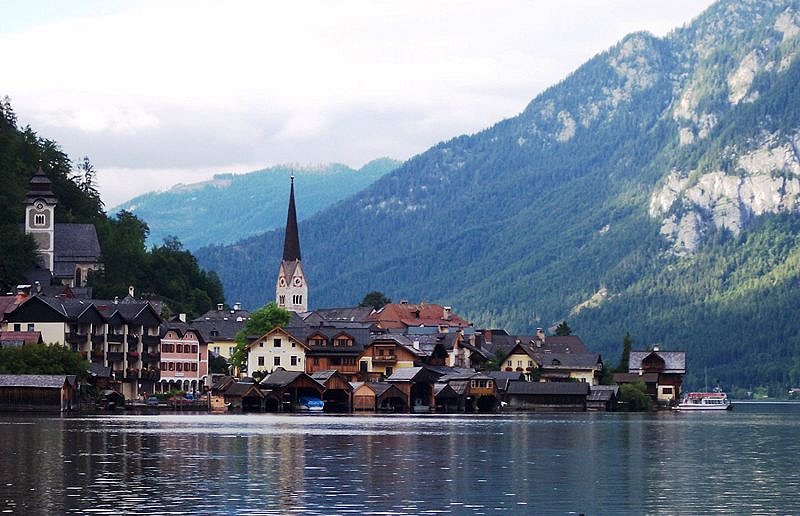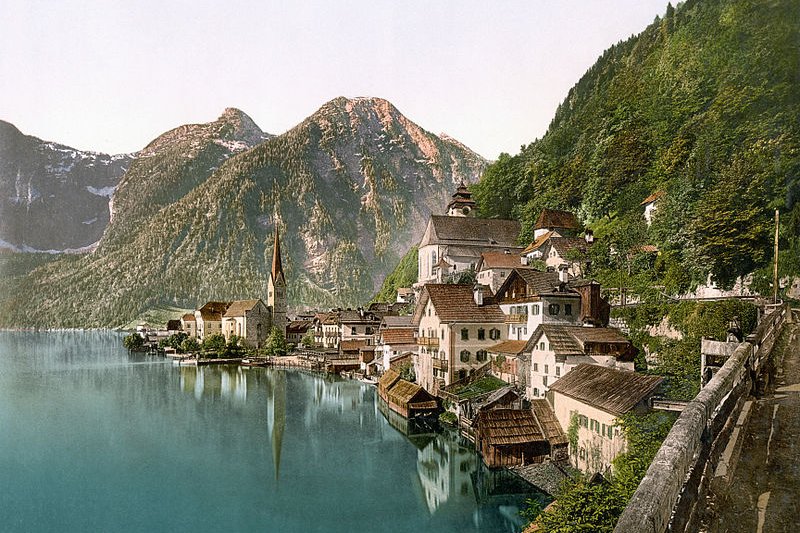 Gorgeous view of Hallstattersee in Austria
Gorgeous view of Hallstattersee in AustriaSource: https://commons.wikimedia.org/wiki/File:Hallst%C3%A4ttersee.jpg
Author: Geber Sascha

The Salzkammergut region in Austria, today a World Heritage Site, has already been inhabited since prehistoric times. The site has salt deposits which have been mined as early as the second millennium BC. It was from salt that Salzkammergut region prospered, and this is reflected by the fabulous buildings found in the medieval town of Hallstatt today.
The Hallstatt-Dachstein/Salzkammergut Cultural Landscape was inscribed as a World Heritage Site during the 21st session of the World Heritage Committee which met in Naples, Italy, on 1-6 December, 1997. The Committee recognised Hallstatt-Dachstein/Salzkammergut alpine region as an outstanding example of a natural landscape of great beauty and scientific interest, and also for the evidence of human economic activity that was integrated harmoniously to the landscape.
 Scenic view of Hallstatt, Austria, with the tall mountains in the background
Scenic view of Hallstatt, Austria, with the tall mountains in the backgroundSource: https://commons.wikimedia.org/wiki/File:Hallstatsight.jpg
Author: Pedroserafin

What to See in Hallstatt-Dachstein/Salzkammergut Cultural Landscape
The Hallstatt-Dachstein/Salzkammergut region is dotted with lakes flanked by soaring mountains, offering wonderful scenic views. It is a place to relax as well as to engage in various recreational activities such as water sports, boating, hiking and cycling.Towns in Salzkammerguit include Hallstatt, Gmunden, Altmünster, Traunkirchen, Ebensee, Obertraun, Gosau, Bad Ischl, Bad Goisern, Bad Aussee, Strobl, St. Wolfgang, St. Gilgen and Fuschl. Of these, Hallstatt is the most popular. This lovely little town is located by the west bank of Lake Hallstatt (Hallstätter See) with the backdrop of the Dachstein mountain range. The landmark of the town is the beautiful Pfarrkirche, a church rising above the town.
 A scenic view of Hallstatt taken in 1900
A scenic view of Hallstatt taken in 1900Source: https://commons.wikimedia.org/wiki/File:Hallstatt_um_1900.jpeg
Author: anonymous

World Heritage Site Inscription Details
Location: N 47 33 34 E 13 38 47Inscription Year: 1997
Type of Site: Cultural
Inscription Criteria: III, IV
Location
The Salzkammergut region stretches from the city of Salzburg to the Dachstein mountain range, covering the Austrian federal states of Upper Austria, which comprises 80% of Salzkammergut, Salzburg, 7%, and Styria, 13%.Etymology
Salzkammerguit means "estate of the salt chamber". This is the name of the Imperial Salt Chamber, the authority regulating the mining of salt during the Habsburg Empire.Getting there
From Vienna, take the West-Autobahn (E60) until Laakirchen. Exit Autobahn to Route 144 all the way to Gmunden, which is one of the towns in Salzkammergut. To reach Hallstatt, from Route 144 continue west on Route 120 to the Salzkammergut-Bundesstraße (Route 145). Continue south on Highway 145 until Stambach, where you take the Paß Gschütt-Bundessttraße (Route 166) southwards to Hallstatt.List of World Heritage Sites in Austria and World Heritage Sites in the World
 Latest updates on Penang Travel Tips
Latest updates on Penang Travel Tips

Copyright © 2003-2025 Timothy Tye. All Rights Reserved.

 Go Back
Go Back